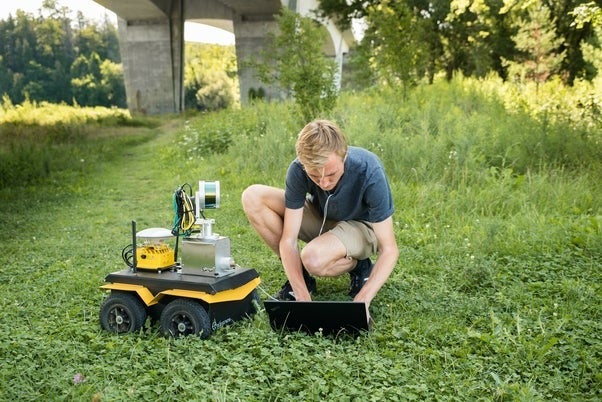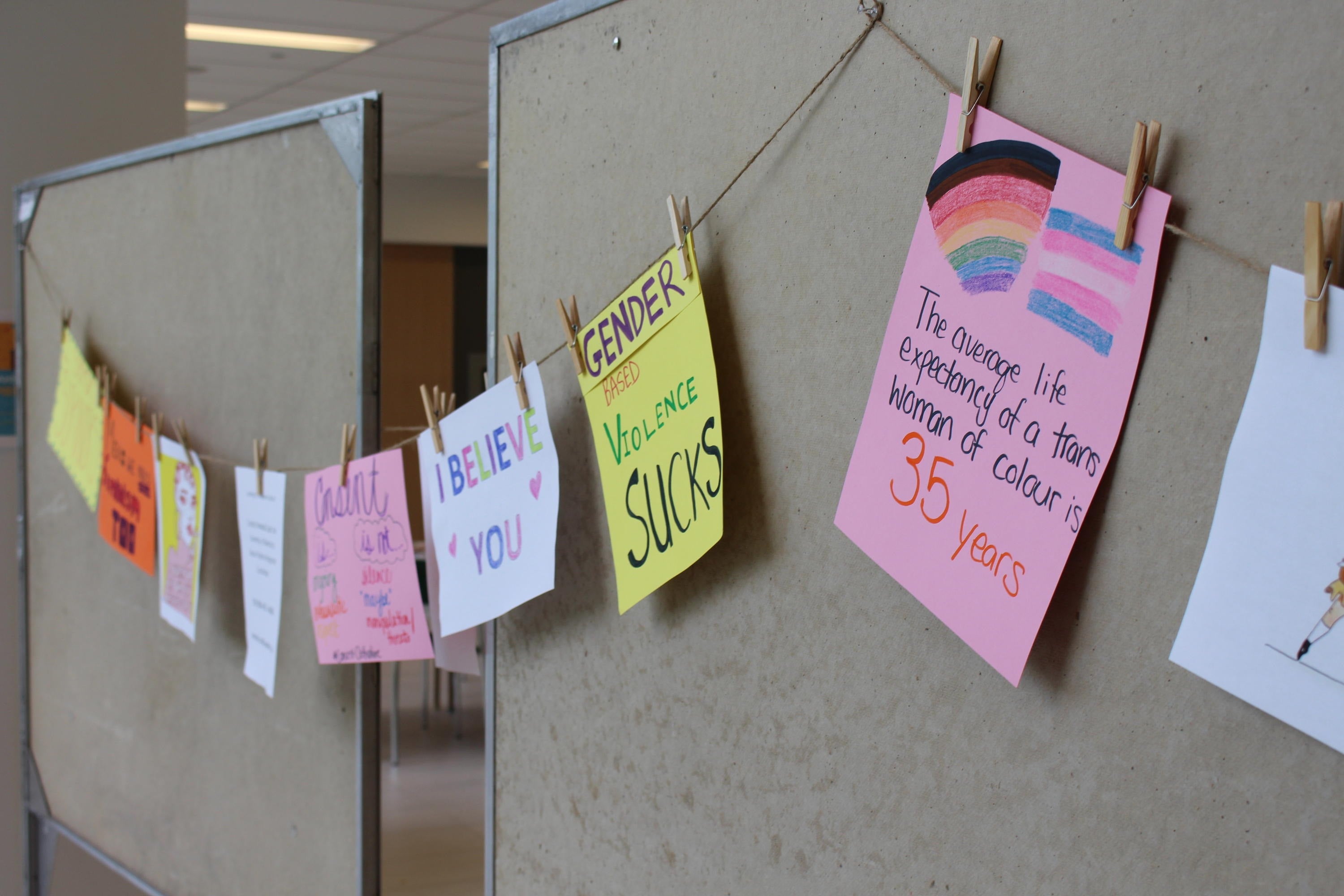Editor:
Brandon Sweet
University Communications
bulletin@uwaterloo.ca
Quest, LEARN, Workday and other central IT systems to enable 2FA

A message from Information Systems & Technology.
Opt-in, two-factor authentication (2FA) is being enabled for campus enterprise systems. After 10:00 a.m. on Wednesday, July 24 users who have previously opted-in to 2FA protection for their Connect OWA or Office 365 account will now also receive a 2FA prompt when they log in to Quest, Workday, LEARN, Unit4, or Concur.
Users who want to opt-in to protect their accounts with 2FA can enrol by visiting https://uwaterloo.ca/2fa and clicking the “Get started now” button.
Anyone with questions or concerns is invited to contact the IST Service Desk at helpdesk@uwaterloo.ca, ext. 44357.
Robots bridge the gap on infrastructure inspections

Stephen Phillips, a PhD student at the University of Waterloo, works with a robotic ground vehicle used in research on automating bridge inspections. Photo: Christopher Bogdon, Clearpath Robotics
This article was originally published on Waterloo News.
Powerful robotics technology developed by researchers at the University of Waterloo makes critical bridge inspections cheaper and more reliable by automating the process.
The new system combines autonomous robots, cameras and lidar – a remote sensing method using lasers — to systematically collect data for defect detection and analysis.
“We can do more than humans now do - and do it much better in every way,” said Sriram Narasimhan, an engineering professor at Waterloo. “It is very inexpensive because you don’t need as many inspectors relying on specialized equipment such as lifts and you get much higher quality information.”
The vast majority of routine tasks during bridge inspections, which are required every few years by regulatory authorities to ensure safety, are done visually by inspectors.
Narasimhan, a Canada Research Chair in Smart Infrastructure, said current practices create an inspection system that is subjective, less repeatable and often imprecise because it is based, at least in part, on educated guesswork.
The automated system, by contrast, eliminates the subjectivity of human inspectors, and is both repeatable and reliable, with the ability to precisely measure the size of defects and reveal invisible, sub-surface problems with infrared cameras.
It is designed so that the results from one inspection can be overlaid on previous inspection results on a detailed map displaying dozens of key vulnerable areas of the subject bridge.
“The benefit is that we can track and quantify defects as they evolve over time,” said Narasimhan, director of the Structural Dynamics Identification and Control Laboratory. “That is not practically possible with humans alone, but it is with the assistance of robots.”
A wheeled ground vehicle used in the research was programmed with an inspection plan detailing instructions on its location and areas of the bridge to focus on.
The same software could also be used for inspections with water-going vehicles and airborne drones, or to inspect other infrastructure such as nuclear power plants and buildings.
Researchers are now developing water-borne inspection platforms and artificial intelligence algorithms to automatically detect and identify particular kinds of defects.
Further down the road, they hope to automate analysis of the data collected by robots to much more accurately assess the structural integrity of infrastructure and forecast the need for repairs or replacement.
“We’re combining our infrastructure expertise with the latest robotics technology to greatly improve what is now a very manual inspection process,” Narasimhan said.
A paper on the research, Automating Data Collection for Robotic Bridge Inspections, appears in the Journal of Bridge Engineering.
Consent Clothesline event today; other notes

The Human Rights, Equity and Inclusion Office has organized a Consent Clothesline event that takes place today. Hosted by Amanda Cook, director of Sexual Violence Prevention and Response, and Sexual Violence Response Coordinator Meaghan Ross, the Consent Clothesline will bring individuals from the campus community together to express, through arts and crafts, what consent means to them and provide messages of support to survivors. The event takes place from 11:00 a.m. to 2:00 p.m. in the Student Life Centre Great Hall.
The W Store | Course Materials + Supplies in South Campus Hall is presenting its "once in a lifetime" Fill-A-Bag Event from July 22 to 24 in the SCH Concourse. "For just $10, fill a bag (provided) with as many books as you can!" says a note from Print + Retail Solutions. Bags are available at the cashier during sale days (and all sales are final). The promotion is valid on sale books in the concourse only, while quantities of both bags and books last.
1969 marks the 50th anniversary of the modern gay rights movement and the Apollo 11 moon landing, and with those two milestones in mind there is a unique opportunity for LGBTQ+ persons studying or working in STEM disciplines: a scientist-astronaut training program that is a collaboration with Stardom Space, Project POSSUM, and the International Institute of Astronautical Sciences. Out Astronaut's aim is to "train the winning candidate through a merit-based selection in the September 2019 Advanced PoSSUM Academy class at Embry-Riddle Aeronautical University. The project then intends to train and fly an exceptional LGBTQ student to space to conduct relevant research while highlighting the contributions of current LGBTQ members making contributions in science and space" with the goal of increasing the visibility of out LGBTQ STEM professionals serving as role models to LGBTQ youth.
Application information can be found on the Out Astronaut website. The deadline for applications is August 1.
Office closure
University Relations in East Campus 5 will be closed today from 2:30 p.m. to 4:15 p.m.
Link of the day
50 years ago: Armstrong, Aldrin and Collins head to the moon
When and Where
Speak Like a Scholar, Monday, July 15 to Thursday, July 18.
Arts 101 Day, Tuesday, July 16.
Integrated LEARN Retreat, Tuesday, July 16.
Consent Clothesline, Tuesday July 16, 11:00 a.m. to 2:00 p.m., SLC Great Hall.
NSERC Discovery Grant drop-in sessions for faculty, Tuesday, July 16, 1:00 p.m. to 2:00 p.m., Student Teaching Complex, Room 2002.
Integrated LEARN Retreat, Wednesday, July 17.
MySharePoint sites will become read-only, Wednesday, July 17. Instructions on moving content is available on the SharePoint website.
NFRF Exploration Grant webinar, offered in English, for faculty, Wednesday, July 17, 10:00 a.m. to 12:00 p.m., Davis Centre, Room 1302.
Waterloo Institute for Complexity and Innovation (WICI) and Faculty of Science Research Networking Lunch, Wednesday, July 17, 12:00 p.m. to 1:30 p.m., DC 1301.
Getting a US Work Permit, Wednesday, July 17, 1:00 p.m. to 2:30 p.m., TC 2218.
NSERC Discovery Grant drop-in sessions for faculty, Wednesday, July 17, 2:00 p.m. to 3:00 p.m., Psychology, Anthropology, Sociology (PAS), Room 2438.
Billion Dollar Briefing, “Get introduced to five different billion-dollar problems that are waiting to be solved,” Wednesday, July 17, 7:30 p.m., Velocity Start, SCH 2nd Floor.
Mathematics 101 Day, Thursday, July 18.
Velocity Fund Finals $5K pitch competition and Fireside chat with Hongwei Liu, Thursday, July 18, 11:00 a.m., SLC Great Hall. RSVP via Eventbrite.
International Education Week planning meeting, Thursday, July 18, 1:00 p.m., EIT 1015. RSVP via Eventbrite.
Graduate Student Stress Management Group, Thursday, July 18, 3:30 p.m., HS 2302.
Waterloo Institute for Complexity and Innovation (WICI)’s Graduate Student Complexity Seminar, Thursday, July 18,, 4:30 p.m. to 5:30 p.m., STC 1019 (speaker and topic TBA).
Résumés, Careers, and Personal Branding – Part II, Thursday, July 18, 4:30 p.m. to 6:30 p.m., DPL 329.
Water Institute WaterTalk, “Importance and Effects of Physical Processes in Lake Ecosystems,” Friday, July 19, 10:30 a.m., DC 1304.
Water Institute WaterTalk, “Addressing Urban Hydrological Issues: An Integrated Water Systems Approach,” Friday, July 19, 1:30 p.m., DC 1302.
Voicescapes: University of Waterloo Choir,Saturday, July 20, 7:30 p.m., The Cedars, 543 Beechwood Drive, Waterloo.
NEW - W Store Fill-A-Bag event, Monday, July 22 to Wednesday, July 24, 9:00 a.m. to 5:00 p.m., SCH concourse.
NSERC Discovery Grant drop-in sessions for faculty, Monday, July 22, 10:00 a.m. to 11:00 a.m., Engineering 7, Room 7411.
Lunch and Learn: The future of waste management at UW, Tuesday, July 23, 12:00 p.m. to 1:00 p.m., EV3 3412.
NEW - Social Impact Showcase, Tuesday, July 23, 4:00 p.m., STP 164.
NEW - QPR Mental Health Training for Students, Wednesday, July 24, 1:30 p.m., NH 2447.
NEW - Eating Disorder Support Group, Wednesday, July 24, 4:00 p.m., NH 3308.
NEW - Coping Skills Seminar - Thriving With Emotions, Wednesday, July 24, 4:00 p.m., HS 2302.
FAUW Indigenization Reading Circle, Thursday, July 25, 10:30 a.m., HH235.
NEW - Shad Waterloo 2019 Open Day Exhibits, Thursday, July 25, 1:30 p.m. to 4:00 p.m., Conrad Grebel Great Hall.
Fairy Tales and Legends: orchestra@uwaterloo, Thursday, July 25, 7:30 p.m., Knox Presbyterian Church, 50 Erb Street W, Waterloo.
NEW - Instrumental Chamber Ensembles Concert, Sunday, July 28, 7:30 p.m., Conrad Grebel University College Chapel.
NEW - Tsinghua-Waterloo Joint Forum on Advances in Energy and Environmental Technologies, Monday, July 29 to Thursday, August 1, Engineering 7.
NEW - Webinar: Copyright for Teaching, Wednesday, July 31, 12:00 p.m.
NEW - KidsAbility Discovery Lab, Wednesday, July 31, 4:00 p.m., 500 Hallmark Drive, Waterloo.
NEW - Coping Skills Seminar - Challenging Thinking, Wednesday, July 31, 4:00 p.m., HS 2302.